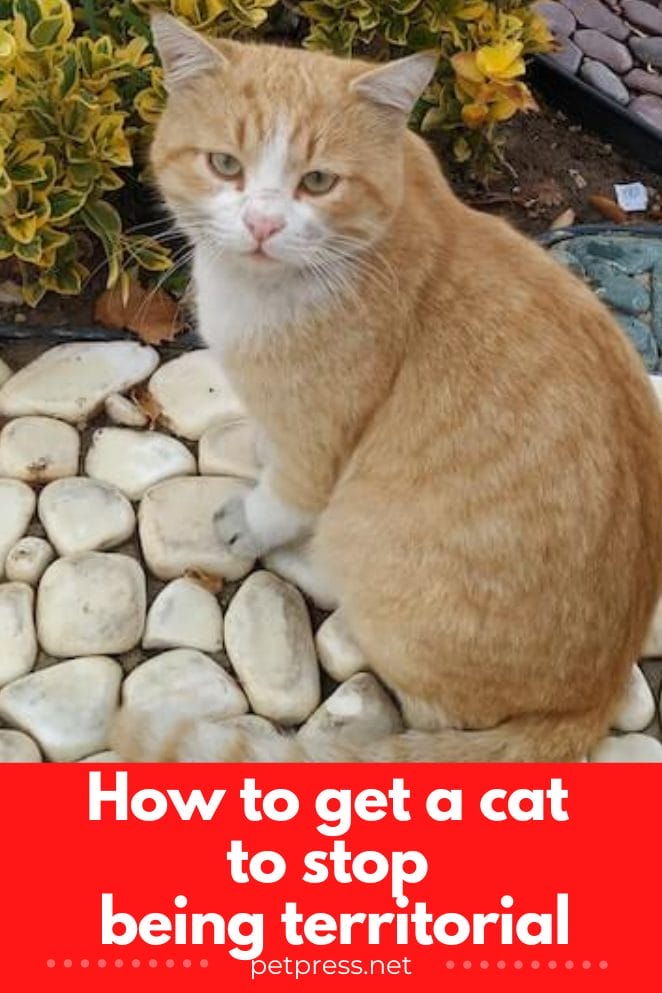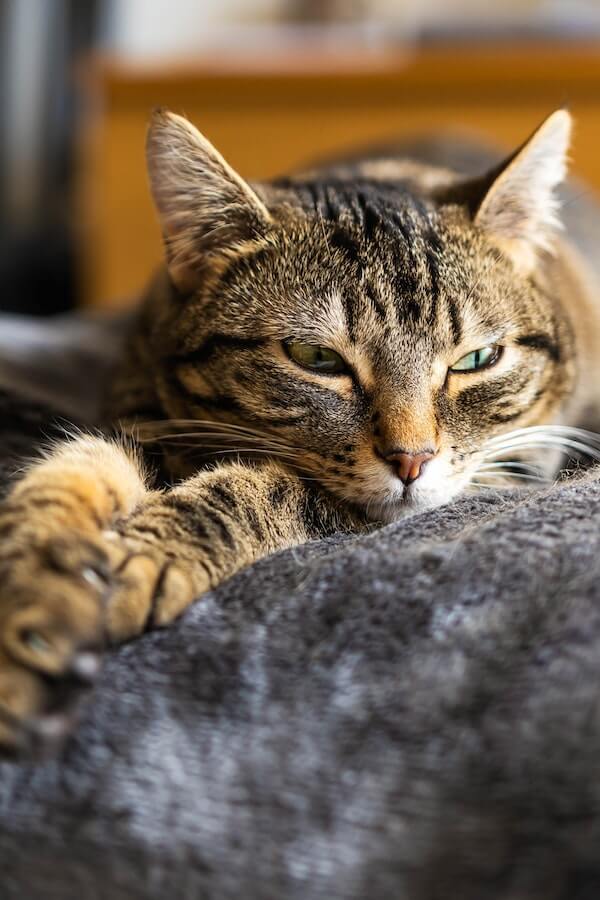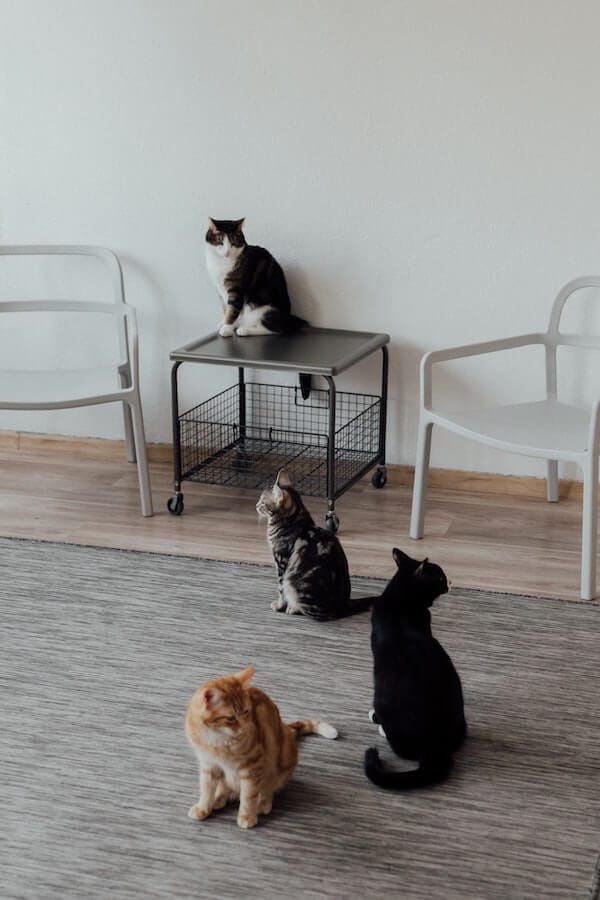
For those of us who have been the victim of a territorial cat, we know the struggle is real! So, how to get a cat to stop being territorial?
Thankfully, there are steps that can be taken to help get your furry friend to stop being territorial.
With patience and consistency, you will soon have an affectionate, cuddly cat that loves you just as much as it loves its own territory.
Take these steps and keep your fingers crossed – hopefully, they will help get your kitty out of its territorial phase!
Let’s dive into it.
Why is my cat being so territorial?

Cats are not known for being the most sociable animals in the world, but sometimes they can become downright territorial.
While it may seem strange to us humans, there are some valid reasons why your cat might be staking its claim on your home. Here are five of them:
1. It’s a matter of safety:
A territorial cat is one that feels secure and comfortable in its environment, so it will do whatever it takes to protect itself from perceived threats.
That could mean hissing at strangers or randomly swatting at objects if it senses any type of danger.
2. Your cat wants everyone else to know who’s boss:
Cats naturally have an authoritative streak, so when new guests arrive, it may see the situation as an opportunity to flex their muscles and show off.
3. Your cat is trying to please you:
Believe it or not, cats can actually bond with their owners through territorial behavior – even if it seems a little aggressive. If your cat sees that you appreciate its protective nature, it may continue to act this way in order to feel closer to you.
4. It’s just being playful:
Territorial behavior isn’t always about aggression; sometimes it’s just plain fun! Increased energy levels can manifest themselves in some pretty unusual ways, such as vigorous swatting at imaginary attackers or chasing shadows around the room.
5. They’re stressed out:
Cats can become territorial due to underlying anxieties or changes in the home environment. If you think this might be the case, it’s important to take them to the vet for a checkup and look into possible treatments or remedies that could help your cat relax.
Do indoor cats get territorial?
Absolutely! Indoor cats can become territorial if they feel threatened or uncomfortable in their environment.
Cats are naturally alert creatures so any change in their home – from the addition of a new piece of furniture to a totally new pet – can make them feel uneasy and cause them to respond aggressively.
What does a territorial cat look like?

If your cat is a territorial kitty, there are a few telltale signs that you can look out for.
Sign #1 Raised fur
One of the most obvious signs is when your cat starts looking extra fluffy and standing tall in an attempt to appear bigger.
This is usually accompanied by tail flicking and ears perked up like antennas – they’re sending signals that they mean business!
Sign #2 Scratching Objects
Another sign of territorial behavior is if they start scratching furniture or carpets around door frames, windows, or other areas where potential intruders could enter their space.
A surefire way to know if this is territorial behavior rather than just boredom? They’ll be making loud meows as part of their ‘security system’.
Sign #3 Vocalization
Thirdly, your cat will likely become agitated when they sense other cats in the area. They’ll usually let off an unusual, low-pitched growling noise to try and scare away any intruders.
If this goes on for more than a few seconds, it’s likely that your cat is feeling territorial.
Sign #4 Hissing
Fourthly, when entering their territory (which could be anything from a room indoors to an outdoor garden), your territorial kitty may respond with swatting or hissing if they don’t recognize you as an owner – so watch out!
Sign #5 Spraying
Finally, if your cat starts spraying objects inside or outside your home with urine then it’s a surefire sign that they’re feeling threatened.
This brings us to one of the most important questions asked by any cat parent:
How to get a cat to stop being territorial

By following these five steps, you can help your cat become less territorial and create a more peaceful home.
1. Get your cat to scratch the right places!
Make sure to provide scratching posts and other areas where your cat is allowed to scratch. This will help redirect their territorial instincts, as it gives them an appropriate outlet for their aggression.
2. Be consistent with discipline
Make sure that if you scold your cat at any time, you need to do so in a consistent manner. That way, they start understanding that certain behaviors are not tolerated, which will eventually teach them what’s okay and what isn’t when it comes to being territorial.
3. Invest in toys and activities
Cats can get bored easily, so providing them with a variety of toys and activities can be very helpful in keeping their interest piqued. This will also help them feel less territorial, as they are occupied and engaged in a more positive way.
4. Make sure your cat is getting enough exercise
Cats need physical activity too! Taking your cat for walks or providing them with interactive toys like laser pointers or feather wands can be great ways to get them out of their comfort zone and reduce their stress levels which may contribute to feeling territorial.
5. Spend quality time with your cat
Cats crave attention just like people do, so make sure you spend some quality one-on-one time with them every day. Petting, playing, and talking to them will help develop a stronger bond between the two of you that could potentially reduce their territorial instincts.
What is the most territorial cat breed?
The title of ‘most territorial cat breed’ is a hotly contested issue, with arguments to be made for several candidates.
Some say Siamese cats take the prize due to their bold personalities and tendency to guard their family’s home fiercely; others claim Maine Coons are especially possessive over their owners and belongings.
For those that want an easy answer: there really isn’t one! Each kitty has its own unique personality, but there are some breeds that tend to be more territorial than others.
Maine Coons have been known as the ‘gentle giants’ of the cat world, but they still have a strong sense of territory when it comes to their family.
Their large size and cuddly nature can become intimidating if they sense their home is being threatened.
Although they rarely express aggression, Maine Coons will not hesitate to alert their owners of any potential danger.
Siamese cats are often seen as fiercely loyal and territorial creatures.
They can be very vocal about communicating when something doesn’t feel right, whether it’s a stranger entering the house or another animal making its way onto their property.
Siamese cats have also been known to protect their humans from perceived threats- and some even stand guard outside the door to ward off intruders!
What gender of the cat is more territorial?

If you’re wondering which gender of cats is more territorial, the answer might surprise you. Contrary to popular belief, it’s actually male cats that are generally more territorial than female cats.
This isn’t to say that a female cat can’t be territorial – she just likely won’t mark her territory as readily as a male cat would.
Male cats tend to spray urine and leave other types of scent markers around their environment in order to assert dominance over their domain.
Female cats, on the other hand, will still claim their territory but usually resort to more subtle methods such as hissing or simply staring down any potential intruders.
Conclusion
The answer to how to get a cat to stop being territorial isn’t always easy, but it is possible.
With patience, understanding and lots of love and attention, cats can learn that their territory doesn’t have to be their own private kingdom.
By providing plenty of interactive toys, playing games with your cat and providing them with a safe environment they can feel secure in, you will be helping your precious kitty overcome her possessive instincts.
All of these combined will help make living peacefully together easier for both you and your feline friend!


GIPHY App Key not set. Please check settings